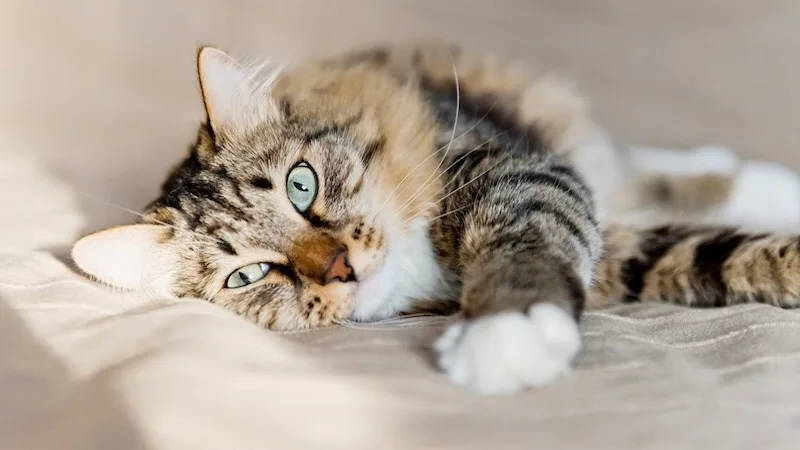Signs Your Senior Cat May Be Sick
Has your cat displayed any of these subtle symptoms of underlying disease? Learn warning signs to talk to your vet about for early diagnosis and treatment options.

Due to their independent nature, it may be difficult to tell how your cat’s health has changed over time. Senior cats will offer subtle clues to their health needs, and you can pick up on the understated signs and symptoms if you know what to watch out for.
Some changes in your cat’s behavior are directly connected to their health. It is important to notice these changes in your cat because they may directly relate to three common senior cat diseases: hyperthyroid syndrome, kidney (renal) disease, and periodontal (dental) disease.
Decline in Grooming Habits in Senior Cats
Pay attention to your cat’s grooming habits. If you notice a change, specifically a decline, in your senior cat’s grooming habits it could be related to their health. Grooming is a daily activity that all cats should perform whether they’re a kitten or a senior, and a healthy cat spends a significant amount of their awake time cleaning and grooming their coat.
A dull, lackluster coat with dandruff, clumps, or matting can indicate that your cat has reduced or stopped grooming because they don’t feel well. When senior cats don’t feel well, it is often due to one of the three common diseases previously mentioned.
Reduction in Appetite Among Senior Cats
Another sign that can indicate an underlying problem is a change in your senior cat’s appetite. There are many factors that may impact your cat’s appetite, but if you notice a sudden increase or decrease in the amount of food your cat is eating, bring it up to your vet in case it’s related to an illness.
To stay in tune and monitor for changes in your cat’s diet, it is best not to free feed. Measuring the amount of food offered and eaten daily will allow you to know when changes in your cat’s diet have occurred. The occasional change in appetite is unlikely to cause concern, but extended changes in appetite should be noted.
Changes in a Senior Cat’s Water Intake
The third subtle sign you can keep an eye out for is a change to your cat’s water intake. There are several underlying medical problems that may cause an increase or decrease in your senior cat’s drinking habits. Measuring out or filling the bowl to the same level daily will help you determine if there are changes to their water intake.
If you are not sure whether your cat is drinking more water, monitor the litter box. Cats with an increase in water intake should urinate more frequently or in larger amounts, saturating the litter box or in some cases urinating outside of their box.
Restlessness in Senior Cats
Two additional changes that may occur gradually involve your cat’s activity level and vocalization. Some underlying diseases can lead to an increase in activity or restlessness, especially at night. Some cats will become more vocal or yowl at odd hours or for extended periods. Other underlying conditions can cause them to sleep more and to be less active. Staying in tune with your senior cat’s routine will help you notice any changes, which should be relayed to your veterinarian.
Talk to Your Vet About Your Senior Cat’s Health
There are more obvious symptoms, such as vomiting, diarrhea, or severe lethargy, that are immediate causes for concern and require a trip to the vet. Changes to grooming, appetite, water intake, and activity level are typically more subtle and may occur gradually over time, making them hard to notice. With regular monitoring, you will start to notice these changes and be able to communicate them to your veterinarian.
There is no expectation for you to try and diagnose your cat’s health conditions, but sharing the information with your vet (information that they can’t find by examining your cat) will help guide their diagnostic testing and treatment. You are one of your veterinarian’s best assets when it comes to determining whether your senior cat may be ill.
For example, hyperthyroid disease, which increases the metabolism rate, can cause cats to eat more food, drink more water, experience restlessness or hyperactivity, and become more vocal. This information will help your veterinarian decide if additional testing is necessary when sending out routine lab screenings.
When cats develop kidney disease, they will usually start to drink more water causing them to urinate more frequently. As the disease progresses, they may experience a decrease in appetite as well as a decrease in grooming, leading to a dull coat.
Periodontal disease, an infection of the gums and bone around the teeth, can cause cats to eat less and groom less often. Because your cat’s mouth is in pain, grooming and eating may be difficult, so your cat may halt them altogether. Switching to soft food and a professional dental exam and cleaning may help your cat get back to normal.

Every Dog and Cat Deserves the Pet Insurance of Champions
Get prize-winning care for your pets.
The Importance of Early Detection in Illness Management for Cats
The earlier one of these common senior cat problems is detected, the better your cat’s prognosis will be for a longer, happier life. Talk to your vet early and often to identify a disease earlier for a better long-term outcome with more options for treatment and management.
Early detection can also slow the progression or prevent secondary problems. With hyperthyroid disease, the metabolism rate can continue to rise when left untreated, leading to significant loss of muscle mass, underlying heart issues, and blood pressure concerns. Although we would still treat the disease, early detection with good at-home observation can prevent these dramatic changes and lessen the negative effects on your senior cat.
When it comes to kidney disease, early detection leads to a discussion on diet and supplements that can slow the progression of the disease and keep your cat better hydrated. Finding periodontal disease early means less pain for your cat and less time and money spent on oral surgery to correct the damage.
For the long-term health of your senior cat, it is best to observe their behavior on a daily basis, so that you will notice these subtle changes if they come up. This way, you can identify changes early and be proactive by sharing the information with your veterinarian. Together with your cat’s healthcare team, you can come up with a plan to help keep your friend happy and healthy for as long as possible.
As your cat ages, medical expenses will increase as they require more care. Having reliable pet insurance coverage is important at every stage of your cat's life. AKC Pet Insurance (underwritten by Independence American Insurance Company) offers plans for cats and dogs of any breed or age.

Every Dog and Cat Deserves the Pet Insurance of Champions
Get prize-winning care for your pets.
Dr. Preston Turano graduated from the University of Illinois College of Veterinary Medicine in 2002. Since that time, he has been a Veterinarian, Medical Director, and Practice Owner.
READ MORE ARTICLES